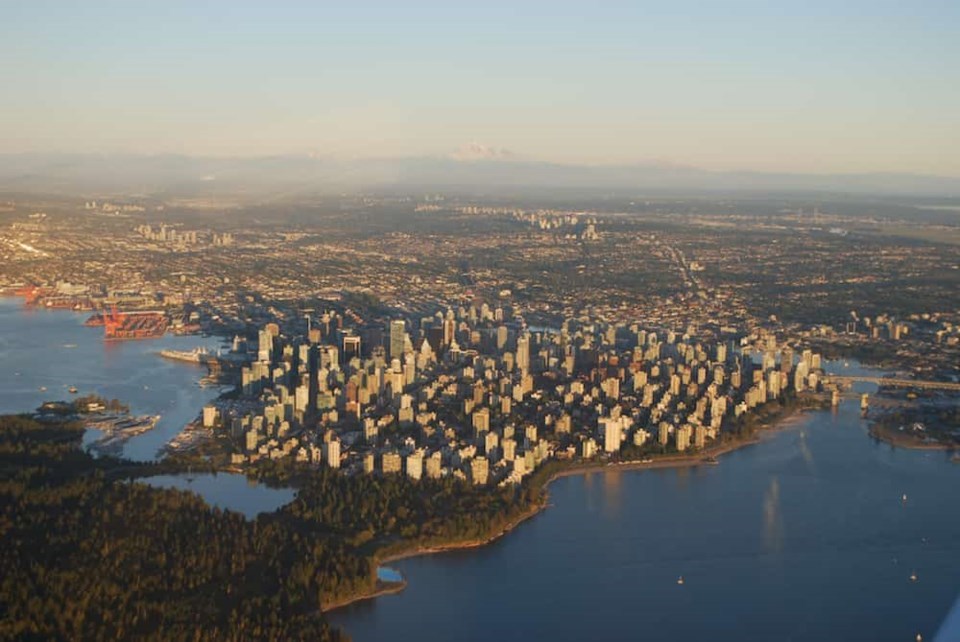Environment Canada has issued two special weather statements for Metro Vancouver due to a number of wildfires burning south of the border and soaring daily high temperatures.
A special weather statement is in effect for:
- Metro Vancouver - central including the City of Vancouver Burnaby and New Westminster
- Metro Vancouver - North Shore including West Vancouver and North Vancouver
- Metro Vancouver - northeast including Coquitlam and Maple Ridge
- Metro Vancouver - southeast including Surrey and Langley
- Metro Vancouver - southwest including Richmond and Delta
For the aforementioned areas, daytime maximum temperatures are forecast to be 5 to 10 degrees above seasonal through Friday.
In a statement, the weather department notes that, "An upper ridge of high pressure is drawing warm air northward from the United States. Temperatures will peak today through Friday with daytime highs that are 5 to 10 degrees celsius above seasonal for this time of year.
"Overnight lows will also be up to 5 degrees warmer than seasonal in some areas."
You should drink plenty of water even before you feel thirsty and stay in a cool place, in addition to reducing your heat risk. Schedule outdoor activities during the cooler parts of the day.
Never leave people or pets inside a parked vehicle.
An Air Quality Advisory is also in effect for:
- Metro Vancouver - NE
- Metro Vancouver - NW
- Metro Vancouver - SE
- Metro Vancouver - SW
Metro Vancouver is continuing an Air Quality Advisory for Metro Vancouver and the Fraser Valley Regional District because of high concentrations of fine particulate matter and has issued an additional advisory for ground-level ozone.
These conditions are expected to persist through tomorrow, and possibly longer. Wildfire smoke from fires in Washington and Oregon continues to impact the region's fine particulate matter concentrations.
In addition, today's hot temperatures combined with wildfire smoke will cause elevated ground-level ozone concentrations. That said, smoke concentrations may vary widely across the region as winds and temperatures change, and as wildfire behaviour changes.
"Ground-level ozone is not emitted directly into the air. It is formed when nitrogen oxides (pollutants emitted when fuels are burned) and volatile organic compounds (emitted from solvents) react in the air in the presence of sunlight. The highest levels of ground-level ozone are generally observed between mid-afternoon and early evening on summer days," notes Environment Canada.
"Fine particulate matter, also known as PM2.5, refers to airborne solid or liquid droplets with a diameter of 2.5 micrometres (µm) or less. PM2.5 can easily penetrate indoors because of its small size."
Persons with chronic underlying medical conditions or acute infections such as COVID-19 should postpone or reduce outdoor physical activity until the advisory is lifted, especially if breathing feels uncomfortable. Exposure is particularly a concern for people with underlying conditions such as lung disease, heart disease, chronic obstructive pulmonary disease (COPD) including bronchitis and emphysema, as well as asthma, and/or diabetes, individuals with respiratory infections such as COVID-19, pregnant women and infants, children, outdoor workers (e.g. construction and agricultural workers), and older adults. Individuals who are socially marginalized may also be at elevated risk.
As we are in the summer season with warm temperatures, it is also important to stay cool and hydrated. Indoor spaces with HEPA air cleaner filtration and air conditioning may offer relief from both heat and air pollution, but physical distancing guidelines for COVID-19 should still be observed. Consider creating a comfortable space at home with a portable air conditioner (if you do not have central air conditioning). If you are experiencing symptoms such as chest discomfort, shortness of breath, coughing or wheezing, seek prompt medical attention. Call 9-1-1 in the case of an emergency.
Read the original article here.



